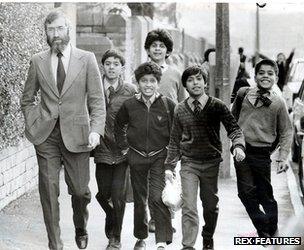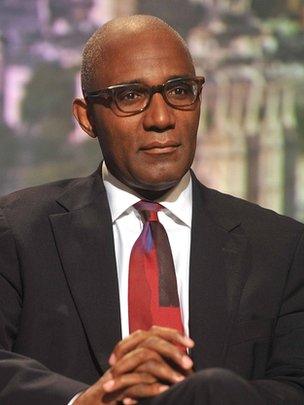Ray Honeyford: Racist or right?
- Published
- comments

Ray Honeyford was denounced as a racist for the views he expressed
Ray Honeyford, the head teacher who caused a national controversy over his outspoken criticisms of multiculturalism in schools, has died. But have his views, which once polarised opinion, become mainstream?
He was, taken at face value, an unlikely critic of multiculturalism.
Ray Honeyford was the head teacher of a school in inner-city Bradford where more than 90% of pupils were non-white.
But he had had enough of the prevailing educational beliefs.
In 1984 he wrote an article for the right-leaning Salisbury Review, external which turned him into a figure of both hatred and hero-worship.
Mr Honeyford dismissed what he saw as many of the ills of the educational legislation and attitudes of the time, arguing there were a "growing number of Asians whose aim is to preserve as intact as possible the values and attitudes of the Indian sub-continent within a framework of British social and political privilege, ie to produce Asian ghettoes".
He also criticised "an influential group of black intellectuals of aggressive disposition, who know little of the British traditions of understatement, civilised discourse and respect for reason".
In other words, multiculturalism - by Mr Honeyford's definition, allowing different cultures to remain separate within the same country - was wrong.
'Mindless zeal'
He went on to attack political correctness as a force for holding back ethnic minority pupils.
He was particularly keen that all children should be taught English as their main language from a young age, writing: "Those of us working in Asian areas are encouraged, officially, to 'celebrate linguistic diversity', ie applaud the rapidly mounting linguistic confusion in those growing number of inner-city schools in which British-born Asian children begin their mastery of English by being taught in Urdu."
Mr Honeyford berated the "determined efforts of misguided radical teachers to place such as the following alongside the works of Shakespeare and Wordsworth - 'Wi mek a lickle date / fi nineteen seventy eight / An wi fite and wi fite / An defeat di state.' (From Inglan is a Bitch, Linton Kwesi Johnson)".
Anticipating that he might be accused of "racisim", he added: "It is the icon word of those committed to the race game. And they apply it with the same sort of mindless zeal as the inquisitors voiced 'heretic' or Senator McCarthy spat out 'Commie'."
The article went largely unnoticed for a couple of months before it was picked up by the mainstream press. Its language and sentiments caused a sensation.
Bradford's then Labour Mayor, Mohammed Ajeeb, called for Mr Honeyford's dismissal.
Hate mail
In April 1985 he was suspended from duty, but he appealed to the High Court and was allowed to go back to work in September.
However, disgruntled parents and others formed an action group, with large-scale protests taking place outside the school. About half the pupils ceased to attend lessons.

Trevor Phillips has criticised multiculturalism for promoting "separateness"
Mr Honeyford was given police protection.
In December 1985 he agreed to retire early, with a pay-off of more than £160,000 from the council, admitting that "anxiety" was getting the better of him.
He never worked as a teacher again.
The case still divides those involved, some saying he had to go and others arguing that he was hounded out by a "hate mob" led by left-wing agitators.
Mohammed Ajeeb stands by his actions more than a quarter of a century later.
He told the BBC: "The article was very critical of the Muslim culture and the race relations situation in the city was not very good at that time.
"If he wanted the Asian children to get better equipped with linguistic skills, he could have advocated the policy of dispersal of pupils among different schools into other areas, which is what I wanted. He could have done that if he was interested in the harmony and mixing of different races and living and working together.
"But he chose simply to criticise the culture and religion. He was not critical of the education system, which I think in those days was responsible for the perpetuation of schools developing in such a way that they were more apart.
"It smacked of cultural chauvinism."
'Breath of fresh air'
He added: "Britain has irreversibly become a multiracial country, a multicultural country. The aim should be how we move forward as a nation, irrespective of religion or national background, to learn to live together with mutual respect and tolerance.
"I thought that Ray Honeyford was trying to promote himself as a cultural defender of certain values, rather than saying there was something that needed to change in the state education system.
"He was a highly intelligent, educated person. His job was not to wander into race politics. His comments were taken up by racist people who made him a hero. I received hate mail saying I should go. I still have a sack full of racist letters I've kept.
"It made my life difficult. My family was threatened. It showed how deep British racism was at the time.
"It's not the substance of what he said that was so offensive. It's how he said it and the right-wing journal in which he chose to say it."
Mr Ajeeb refutes the idea that "the left" in Bradford and elsewhere tried to "drive out" Mr Honeyford.
But, in a parliamentary debate held in April 1985, when the head teacher was under suspension, the Conservative MP Marcus Fox argued exactly the opposite.
He called Mr Honeyford's views "a breath of fresh air in the polluted area of race relations", although speaking out had "brought down a holocaust on his head".
Mr Fox added: "One would think that somehow in this day and age it was racist to teach English."
'Thought police'
Mr Fox died in 2002, but another MP who took part in the debate was the Liberal Michael Meadowcroft.
Now a director of the Democracy International consultancy group, he told the BBC: "I found Ray Honeyford extremely right-wing. I didn't like his views at all.
"They were expressed badly, but that's not the point. You can't have thought police."
Mr Meadowcroft, who protested against Mr Honeyford's suspension and dismissal, added: "There wasn't a problem with the way he ran the school. He followed the local authority's guidelines. People are able to have their own policy views but still do their job to the best of their ability.
"Ray Honeyford was very popular with the parents at the school, but the campaign against him was very nasty.
"Feeling was whipped up in the community. The Labour left was really powerful at the time. It did the whipping up.
"The Labour left was upset that he made the case that young kids should learn English from the age of four or five. But that idea's become much more acceptable since then."
'Heroic'
In 2004, Trevor Philips, the head of the Commission for Racial Equality and a former Labour parliamentary candidate, asserted that children needed to be given a "core of Britishness".
Multiculturalism, he argued, suggested "separateness".
In words reminiscent of Mr Honeyford's, yet more delicately put, he said: "For instance, I hate the way this country has lost Shakespeare. That sort of thing is bad for immigrants."
The irony was not lost on Mr Honeyford, who wrote in the Daily Mail the next year: "He is lauded for his wisdom. I was sacked for my alleged racism and was never allowed to work as a teacher again."
In his tribute to the former head teacher, who has died at the age of 77, the editor of the Salisbury Review, Roger Scruton, wrote: "Readers will be grateful for the life of this exemplary, heroic and profoundly gentle man, who was prepared to pay the price of truth at a time of lies."
Mr Ajeeb said: "I wish his family well and I respect him, but I still disagree with him."
Political opinion may have moved in Mr Honeyford's direction, but not completely.